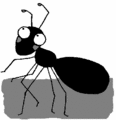"Ontology" is a word that used to belong in philosophy as any kind of systematic description of existence. I can't say I entirely get it, but it would be like a flow chart or verbal description of a world view. Like a religious or scientific way of describing the mechanics of the universe in some detail. See more here. Then it became a key concept in artificial intelligence. There it would also be a specification of a world view, but usually more limited. It would define, say, for a robot what "exists". The walls are there, and your tools there. Or it would try to structure a picture of the world so that a natural language program might be able to say something half-intelligent about it. "The hipbone is connected to the tailbone." And now ontologies are also a key piece in knowledge sharing and trying to create a semantic web. If knowledge needs to be shared effectively amongst a diverse group of people, it becomes very important to also have a good representation of what world view or context the knowledge relates to or exists in. See more here. An ontology might sometimes be represented as a taxonomy, which is another hard word, relating to a hierarchy of labels, such as the way animals are classified, or the Dewey decimal system. An ontology doesn't have to be limited like that, though. Which makes it all the harder to wrap one's mind around. Anyway, what I was trying to get to was what Denham Grey was saying about what an ontology is:A (shared) expression of belief, an agreement on the terminology (and sometimes the meaning) for communication and action. Ontologies serve to bound discourse, facilitate communication within & across communities and networks, leverage action by gathering agreement around meaning, values, objects, the way things are and what is 'out there' that is important. Ontologies help to orientate new folks and act as the stores for key learnings & distinctions accumulated through experience. Ontologies have a large influence on identity and help with the tacit transfer of context. I'm still a bit confused. But it is an important subject in a world with an accelerating volume of information that we're at the same time trying to make more meaningful. In electronic media we can only with difficulty share meaning unless we have good ways or representing large complex sets of relationships and rules and concepts fairly finitely, and we know we're speaking the same language. If we could just transfer a "thoughtball" that gives the whole picture and sets the whole stage, we might have a better chance of communicating meaningfully. "Here you go, here's my world! Study up on it and we can talk meaningfully in the morning."
[ Knowledge | 2003-11-29 19:02 | | PermaLink ] More >
|
 Lennard Grahn via Thomas Madsen-Mygdal:
Lennard Grahn via Thomas Madsen-Mygdal: Roger is doing some good thinking about how to make an annotated web:
Roger is doing some good thinking about how to make an annotated web: